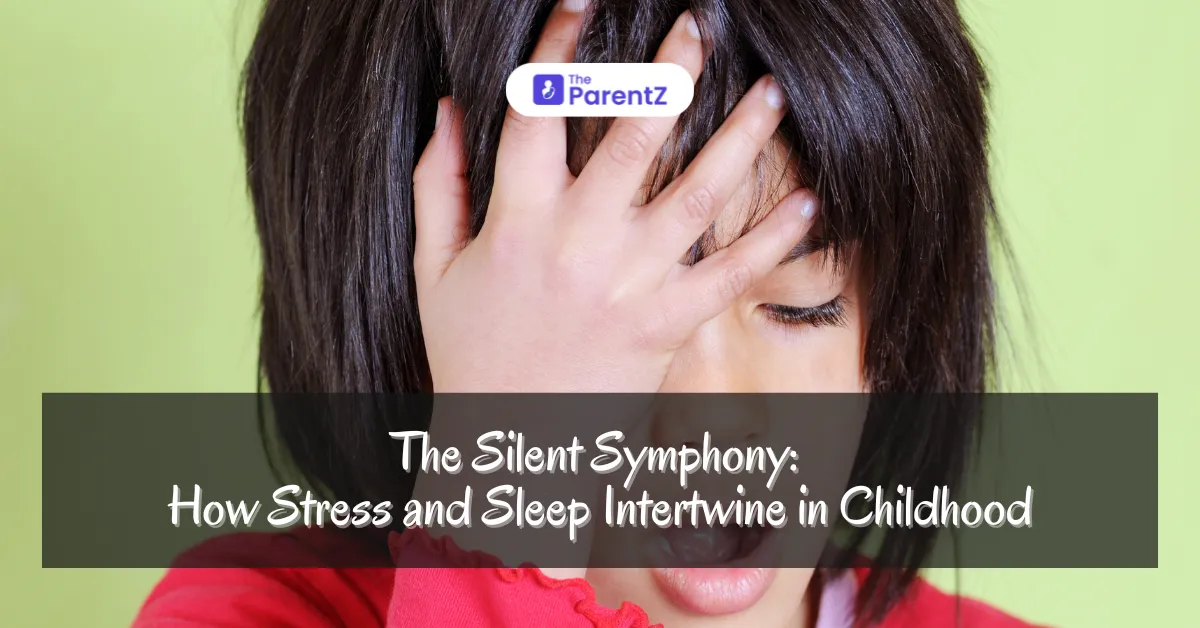Have you ever noticed that when your child is stressed, they seem to struggle with sleep? Or perhaps, when they're not sleeping well, they become more irritable and prone to stress? This intricate relationship between stress and sleep is a common concern for many parents. This blog explores this connection and how it affects children's development and overall well-being.
The Stress-Sleep Cycle: A Vicious Circle
Stress and sleep are intertwined in a complex cycle. When children experience stress, whether it's from school, social interactions, or family dynamics, their bodies initiate a sophisticated biochemical response. The hypothalamic-pituitary-adrenal (HPA) axis springs into action, releasing cortisol—the primary stress hormone. Unlike adult stress responses, children's physiological reactions are more volatile and can have more pronounced long-term implications.
Cortisol isn't inherently harmful. In balanced amounts, it helps children navigate challenges. However, chronic elevation disrupts crucial neurological processes, particularly those governing sleep architecture. High cortisol levels interfere with melatonin production, the hormone responsible for regulating sleep-wake cycles.
Conversely, poor sleep quality can exacerbate stress. When children don't get enough sleep, their bodies are unable to recover and recharge. This often leads to increased irritability, difficulty concentrating, and heightened sensitivity to stress.
Impact of Stress and Sleep in Children
The interplay between stress and sleep is particularly critical in children, as both factors significantly influence their neurological development and psychological well-being.
Neurological Implications
Sleep is needed for brain development, especially in children, whose brains are rapidly growing and evolving. Research shows that inadequate sleep often leads to functional changes in brain regions crucial for emotion regulation, such as the amygdala. This part of the brain is responsible for processing emotions and managing stress responses. Studies have shown that children who experience shorter sleep durations and later bedtimes exhibit reduced amygdala size and weaker connections to other emotion-processing areas in the brain. These alterations can hinder their ability to cope with stress and manage negative emotions effectively.
The consequences of sleep deprivation extend beyond emotional regulation; they also impact cognitive functions. Sleep greatly affects memory consolidation, learning, and overall cognitive performance. Insufficient sleep can impair long-term potentiation (LTP), a process critical for synaptic plasticity—the foundation of learning and memory.
For children, this means that chronic sleep deprivation can lead to difficulties in school performance, attention deficits, and challenges in social interactions.
Moreover, the effects of stress on sleep can create a vicious cycle. When children experience stress—whether from academic pressures, social challenges, or family dynamics—they may struggle to fall asleep or stay asleep. This lack of restorative sleep further exacerbates their stress levels, leading to a decline in mental health. The neurological consequences of this cycle can be profound; chronic stress during critical developmental periods leads to lasting changes in brain structure and function, potentially predisposing children to anxiety disorders or depression later in life.
Psychological Dimensions
The psychological dimensions of the stress-sleep connection are equally significant. Stressful experiences during childhood, including parental conflict, academic pressure, or exposure to adverse environments, can lead to increased anxiety and behavioral issues. Children who are stressed often exhibit symptoms such as irritability, mood swings, and difficulty concentrating—all of which interferes with their ability to achieve restful sleep.
Maternal stress during pregnancy has also been related to sleep disturbances in children. Studies suggest that prenatal stress can predispose children to sleep problems that persist throughout early childhood. The psychological ramifications of this prenatal exposure include elevated anxiety levels and difficulties with emotional statutes as the child grows older.
Furthermore, it is essential to recognize that the psychological impact of poor sleep is not limited to children alone; parents also experience significant stress related to their children's sleep issues. Parents caring for children with developmental disabilities often report higher levels of parental stress, which correlates with poorer sleep quality. This situation creates a dual challenge: parents must manage their own stress while also addressing their child's emotional needs.
Creating a Stress-Mitigating Sleep Environment
Consistent Bedtime Rituals
- Develop predictable, calming pre-sleep routines
- Incorporate gentle sensory experiences
- Use soft lighting and minimal stimulation
Emotional Processing Techniques
- Implement age-appropriate stress-reduction practices
- Practice mindful breathing together
- Create safe spaces for emotional expression
Nutritional and Physical Considerations
- Limit screen time, especially before bedtime
- Ensure balanced nutrition supporting neurological health
- Encourage regular physical activity
Conclusion
In conclusion, addressing the intertwined nature of stress and sleep can lead to healthier outcomes for children, equipping them with the resilience needed to navigate life's challenges effectively. Remember, children are not just experiencing stress—they're learning how to process, understand, and ultimately master their emotional worlds. Your role is not to eliminate stress but to provide a secure, understanding framework for navigating it.









Be the first one to comment on this story.